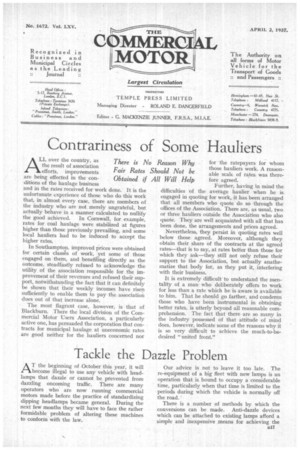Contrariness of Some Hauliers
Page 31

If you've noticed an error in this article please click here to report it so we can fix it.
ALL over the country, as the result of association efforts, improvements are being effected in the conditions of the haulage business and in the rates received for work done. It is the unfortunate experience of those who do this work that, in almost every case, there are members of the industry who are not merely ungrateful, but actually behave in a manner calculated to nullify the good achieved. In Cornwall, for example, rates for coal haulage were stabilized at figures higher than those previously prevailing, and some local hauliers had to be induced to accept the higher rates. .
In Southampton, improved prices were obtained for certain classes of work, yet some of those engaged on them, and benefiting directly as the outcome, steadfastly refused to acknowledge the utility of the association responsible for the improvement of their revenues and refused their support, notwithstanding the fact that it can definitely be shown that their weekly incomes have risen sufficiently to enable them to pay the association dues out Of that increase alone.
The most flagrant case, however, is that of Blackburn. There the local division of the Commercial Motor Users Association, a particularly active one, has persuaded the corporation that contracts for municipal haulage at uneconomic rates are good neither for the hauliers concerned nor for the ratepayers for whom those hauliers work. A reasonable scale of rates was therefore agreed.
Further, having in mind the difficulties of the average haulier when he is engaged in quoting for work, it has been arranged that all members who quote do so through the offices of the Association. There are, as usual, two or three hauliers outside the Association who also quote. They are well acquainted with all that has been done, the arrangements and prices agreed.
Nevertheless, they persist in quoting rates well below those agreed. Moreover, although they obtain their share of the contracts at the agreed rates—that is to say, at rates better than those for which they ask—they still not only refuse their support to the Association, but actually anathematize that body for, as they put it, interfering with their business.
It is extremely difficult to understand the mentality of a man who deliberately offers to work for less than a rate which he is aware is available to him. That he should go farther, and condemn those who have been instrumental in obtaining better rates, is utterly beyond all reasonable comprehension. The fact that there are so many in the industry possessed of that attitude of mind does, however, indicate some of the reasons why it is so very difficult to achieve the much-to-bedesired "united front."




























































































